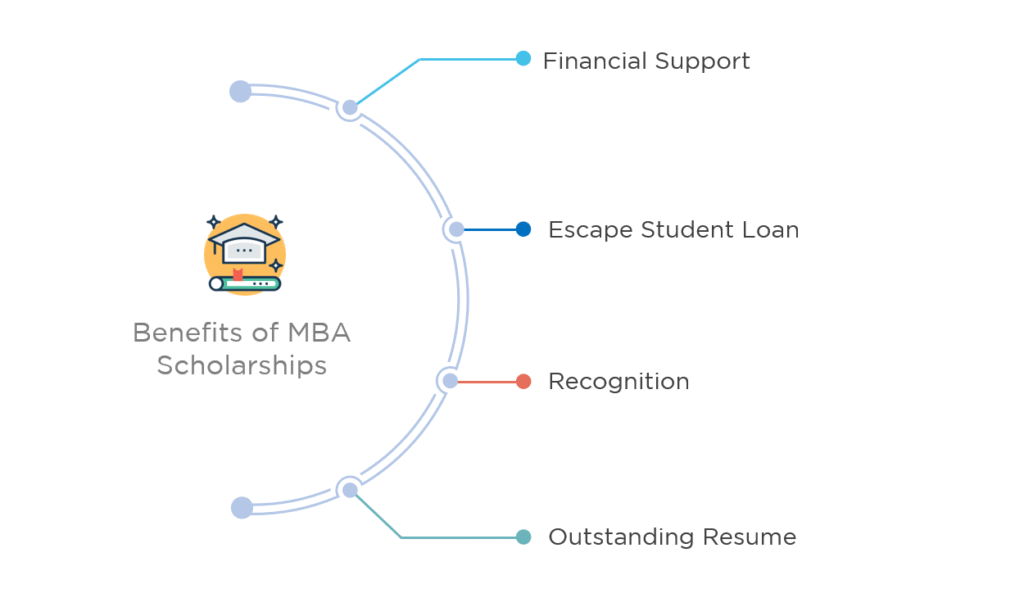Pursuing an MBA can be a transformative experience, offering advanced business skills, leadership development, and career advancement opportunities. However, the cost of MBA programs can be a significant barrier for many prospective students. Fortunately, a variety of MBA scholarships exist to help ease the financial burden. These scholarships are designed to reward academic excellence, leadership potential, diversity, and unique personal or professional backgrounds.
This article explores some of the best MBA scholarships available today, what makes them stand out, eligibility criteria, and tips on how to secure these valuable awards. Whether you’re a fresh graduate, a working professional, or an international student, there are numerous options to help fund your MBA journey.
Key Takeaways
- MBA scholarships are crucial financial resources that can significantly reduce tuition costs.
- There are multiple types of scholarships including merit-based, need-based, diversity, and specialized awards.
- Top scholarships today include Forté Fellowships, Fulbright, Skoll Scholarship, Stanford Reliance Fellowship, HBS Fellowships, and INSEAD scholarships.
- Start early, research extensively, and tailor your applications to increase your chances.
- Many scholarships support international students and various MBA formats.
- Writing compelling essays and demonstrating leadership can set you apart.
- Applying to multiple scholarships maximizes your funding potential.
Securing the right MBA scholarships can transform your education journey and open the door to a brighter professional future.
Understanding MBA Scholarships

ursuing an MBA is a major investment, both in terms of time and money. Top-tier business schools around the world charge tuition fees that can easily exceed $100,000, and that’s not including living expenses, books, travel, and opportunity cost. This financial burden often discourages promising candidates from applying. However, MBA scholarships exist as a vital tool to make this prestigious degree more accessible and equitable.
In this section, we break down the fundamentals of MBA scholarships, including what they are, the different types available, who provides them, and how they can impact your academic and professional journey.
What Are MBA Scholarships?
MBA scholarships are financial awards given to MBA students to help cover part or all of the costs associated with earning their degree. Unlike loans, scholarships do not need to be repaid. They are awarded based on a range of criteria, including academic merit, leadership potential, financial need, professional accomplishments, and personal background.
MBA scholarships serve several purposes:
- Reducing financial barriers for talented candidates who may not afford business school otherwise.
- Promoting diversity and inclusion in business education by supporting candidates from underrepresented groups.
- Attracting top talent to enhance a business school’s academic reputation and community.
- Encouraging students to pursue careers in fields that serve the public interest, such as nonprofit leadership or sustainable business.
For students, winning an MBA scholarship can mean the difference between attending a dream school or settling for a less ideal option due to cost.
Types of MBA Scholarships

MBA scholarships are not one-size-fits-all. They come in different forms, each targeting specific types of candidates or objectives. Understanding the different categories helps applicants find awards that best match their profile.
Merit-Based Scholarships
These scholarships are awarded based on a candidate’s academic excellence, test scores (such as the GMAT/GRE), leadership achievements, career progression, and overall application strength. They are highly competitive and are often awarded to the top applicants in a given admissions cycle.
Need-Based Scholarships
Need-based MBA scholarships are designed for students who demonstrate significant financial need. These awards require applicants to submit financial documents or complete a separate application detailing their economic background. Schools like Harvard Business School and Stanford GSB offer generous need-based fellowships.
Diversity Scholarships
To encourage a more inclusive and representative business environment, many institutions and external organizations offer scholarships to underrepresented groups, including women, people of color, LGBTQ+ students, and military veterans. These scholarships aim to close equity gaps and empower more diverse leadership in the corporate world.
Career-Specific or Industry Scholarships
Some scholarships are designed to attract students pursuing careers in specific sectors like healthcare, finance, technology, nonprofit, or entrepreneurship. For instance, the Skoll Scholarship at Oxford supports social entrepreneurs, while the Forté Fellowship supports women pursuing business leadership.
School-Specific Scholarships
Most top business schools offer their own MBA scholarships that are tied to the institution’s mission and priorities. These can range from full-ride fellowships to partial tuition discounts. Some scholarships are automatically considered with your application, while others require separate materials.
Government and Corporate Scholarships
Governments, especially in developing countries, offer scholarships to promote talent development. At the same time, many multinational corporations sponsor MBA scholarships for employees or candidates who commit to working in specific industries or regions after graduation.
Who Offers MBA Scholarships?
MBA scholarships can be offered by a wide range of sources. Understanding the key players can help applicants know where to look.
- Business schools: The most common source. Nearly every major MBA program has a range of internal scholarships.
- Foundations and nonprofits: Organizations like the Forté Foundation or the Fulbright Program support specific student demographics or missions.
- Government agencies: Many countries offer public funding for international studies, especially for students who plan to return and contribute to national development.
- Private companies: Some businesses sponsor scholarships to groom future leaders for their workforce.
- Alumni and endowments: Past graduates of MBA programs often fund scholarships to give back to their alma mater and support future students.
Benefits of MBA Scholarships

The benefits of MBA scholarships go beyond financial relief. Here are a few key advantages:
- Reduced financial pressure: This can help students focus on learning and networking instead of worrying about debt.
- Access to top schools: With scholarships, even high-cost schools become attainable.
- Prestige and resume boost: Winning a competitive scholarship reflects positively on your abilities and character.
- Networking opportunities: Many scholarship programs include mentorship, conferences, and career development events.
- Support for non-traditional careers: Scholarships often empower students to take lower-paying, mission-driven jobs they’re passionate about.
Challenges and Misconceptions
Despite the many benefits, there are also misconceptions and challenges that students face when applying for MBA scholarships:
- Myth: Scholarships are only for the top 1%: While merit-based awards are competitive, there are many scholarships based on need, diversity, or specific interests that welcome a broader range of applicants.
- Myth: International students are not eligible: In fact, many top MBA programs offer MBA scholarships specifically for non-U.S. citizens.
- Challenge: Lack of awareness: Many candidates miss deadlines or fail to apply because they don’t know these scholarships exist.
- Challenge: Application complexity: Some scholarships require essays, interviews, and detailed financial documentation, which can be time-consuming to prepare.
To overcome these, candidates should start researching early, make a list of scholarships they’re eligible for, and seek guidance from admissions counselors or past recipients.
Timing and Application Tips
Timing is crucial when applying for MBA scholarships. Here are some practical tips:
- Apply in early admission rounds: Some business schools allocate the majority of their scholarship funds in earlier rounds.
- Track deadlines: External scholarships often have different deadlines than the MBA application.
- Reuse materials: You can often repurpose your MBA essays and recommendation letters for scholarship applications.
- Be authentic: Scholarship committees value sincerity, impact, and passion. Don’t just try to impress—show your real story.
- Ask for help: Use school resources, online forums, or scholarship consultants to polish your applications.
Final Thoughts
Understanding MBA scholarships is essential for anyone considering business school. They not only ease the financial burden but also provide recognition, resources, and networks that can enrich your MBA experience. Whether you’re aiming for a top-tier school, shifting careers, or entering a non-traditional path, there’s likely a scholarship that aligns with your goals.
By learning the types, sources, and strategies for securing these awards, prospective MBA students can turn what may seem like an unaffordable dream into a tangible, achievable reality.
What Are MBA Scholarships?
MBA scholarships are financial awards given to MBA students to help cover part or all of the costs associated with earning their degree. Unlike loans, scholarships do not need to be repaid. They are awarded based on a range of criteria, including academic merit, leadership potential, financial need, professional accomplishments, and personal background.
MBA scholarships serve several purposes:
- Reducing financial barriers for talented candidates who may not afford business school otherwise.
- Promoting diversity and inclusion in business education by supporting candidates from underrepresented groups.
- Attracting top talent to enhance a business school’s academic reputation and community.
- Encouraging students to pursue careers in fields that serve the public interest, such as nonprofit leadership or sustainable business.
For students, winning an MBA scholarship can mean the difference between attending a dream school or settling for a less ideal option due to cost.
Types of MBA Scholarships
MBA scholarships are not one-size-fits-all. They come in different forms, each targeting specific types of candidates or objectives. Understanding the different categories helps applicants find awards that best match their profile.
Merit-Based Scholarships
These scholarships are awarded based on a candidate’s academic excellence, test scores (such as the GMAT/GRE), leadership achievements, career progression, and overall application strength. They are highly competitive and are often awarded to the top applicants in a given admissions cycle.
Need-Based Scholarships
Need-based MBA scholarships are designed for students who demonstrate significant financial need. These awards require applicants to submit financial documents or complete a separate application detailing their economic background. Schools like Harvard Business School and Stanford GSB offer generous need-based fellowships.
Diversity Scholarships
To encourage a more inclusive and representative business environment, many institutions and external organizations offer scholarships to underrepresented groups, including women, people of color, LGBTQ+ students, and military veterans. These scholarships aim to close equity gaps and empower more diverse leadership in the corporate world.
Career-Specific or Industry Scholarships
Some scholarships are designed to attract students pursuing careers in specific sectors like healthcare, finance, technology, nonprofit, or entrepreneurship. For instance, the Skoll Scholarship at Oxford supports social entrepreneurs, while the Forté Fellowship supports women pursuing business leadership.
School-Specific Scholarships
Most top business schools offer their own MBA scholarships that are tied to the institution’s mission and priorities. These can range from full-ride fellowships to partial tuition discounts. Some scholarships are automatically considered with your application, while others require separate materials.
Government and Corporate Scholarships
Governments, especially in developing countries, offer scholarships to promote talent development. At the same time, many multinational corporations sponsor MBA scholarships for employees or candidates who commit to working in specific industries or regions after graduation.
Who Offers MBA Scholarships?
MBA scholarships can be offered by a wide range of sources. Understanding the key players can help applicants know where to look.
- Business schools: The most common source. Nearly every major MBA program has a range of internal scholarships.
- Foundations and nonprofits: Organizations like the Forté Foundation or the Fulbright Program support specific student demographics or missions.
- Government agencies: Many countries offer public funding for international studies, especially for students who plan to return and contribute to national development.
- Private companies: Some businesses sponsor scholarships to groom future leaders for their workforce.
- Alumni and endowments: Past graduates of MBA programs often fund scholarships to give back to their alma mater and support future students.
Benefits of MBA Scholarships
The benefits of MBA scholarships go beyond financial relief. Here are a few key advantages:
- Reduced financial pressure: This can help students focus on learning and networking instead of worrying about debt.
- Access to top schools: With scholarships, even high-cost schools become attainable.
- Prestige and resume boost: Winning a competitive scholarship reflects positively on your abilities and character.
- Networking opportunities: Many scholarship programs include mentorship, conferences, and career development events.
- Support for non-traditional careers: Scholarships often empower students to take lower-paying, mission-driven jobs they’re passionate about.
Challenges and Misconceptions
Despite the many benefits, there are also misconceptions and challenges that students face when applying for MBA scholarships:
- Myth: Scholarships are only for the top 1%: While merit-based awards are competitive, there are many scholarships based on need, diversity, or specific interests that welcome a broader range of applicants.
- Myth: International students are not eligible: In fact, many top MBA programs offer MBA scholarships specifically for non-U.S. citizens.
- Challenge: Lack of awareness: Many candidates miss deadlines or fail to apply because they don’t know these scholarships exist.
- Challenge: Application complexity: Some scholarships require essays, interviews, and detailed financial documentation, which can be time-consuming to prepare.
To overcome these, candidates should start researching early, make a list of scholarships they’re eligible for, and seek guidance from admissions counselors or past recipients.
Timing and Application Tips
Timing is crucial when applying for MBA scholarships. Here are some practical tips:
- Apply in early admission rounds: Some business schools allocate the majority of their scholarship funds in earlier rounds.
- Track deadlines: External scholarships often have different deadlines than the MBA application.
- Reuse materials: You can often repurpose your MBA essays and recommendation letters for scholarship applications.
- Be authentic: Scholarship committees value sincerity, impact, and passion. Don’t just try to impress—show your real story.
- Ask for help: Use school resources, online forums, or scholarship consultants to polish your applications.
Final Thoughts
Understanding MBA scholarships is essential for anyone considering business school. They not only ease the financial burden but also provide recognition, resources, and networks that can enrich your MBA experience. Whether you’re aiming for a top-tier school, shifting careers, or entering a non-traditional path, there’s likely a scholarship that aligns with your goals.
By learning the types, sources, and strategies for securing these awards, prospective MBA students can turn what may seem like an unaffordable dream into a tangible, achievable reality.
Top MBA Scholarships Available Today
Forté Foundation Fellowships
The Forté Foundation is one of the most renowned organizations promoting women in business leadership. Their fellowships are awarded to outstanding female MBA candidates at partner business schools globally. The goal is to close the gender gap in business leadership by supporting talented women through scholarships and networking opportunities.
If you are a woman pursuing an MBA, Forté fellowships can offer significant financial support alongside mentorship and career resources.
The Fulbright Foreign Student Program
For international students aiming to study MBA programs in the United States, the Fulbright program is a prestigious scholarship funded by the U.S. government. It covers tuition, living expenses, and health insurance, among other benefits. The program encourages cultural exchange and leadership development.
Applying for Fulbright requires a strong academic record, leadership potential, and a commitment to advancing mutual understanding between countries.
The Skoll Scholarship
The Skoll Scholarship is for MBA students passionate about social entrepreneurship. Offered by the University of Oxford’s Said Business School and other select institutions, this scholarship supports those who seek to create large-scale social impact through business.
Recipients of the Skoll Scholarship benefit not only from financial support but also from a network of social entrepreneurs and access to specialized programming.
The Stanford Reliance Dhirubhai Fellowship
This fellowship is designed for Indian nationals admitted to Stanford Graduate School of Business. It aims to develop future business leaders who will make a significant impact in India. It covers the full tuition and offers living expenses for the duration of the MBA.
This scholarship is highly competitive and targets students with a strong commitment to India’s growth and development.
The Harvard Business School (HBS) Fellowship Programs
HBS offers a variety of fellowships for MBA students, including merit-based and need-based awards. Many fellowships target specific demographics, industries, or regions. For example, the HBS Social Enterprise Fellowship supports students working in nonprofit or social sectors.
Due to Harvard’s global reputation, securing an HBS fellowship can greatly reduce the cost of one of the world’s most prestigious MBA programs.
The INSEAD MBA Scholarships
INSEAD, one of the world’s top international business schools, offers over 70 different scholarships to MBA candidates, including merit-based, diversity, and need-based awards. Some scholarships focus on specific nationalities or career goals.
INSEAD’s wide variety of MBA scholarships makes it accessible to a diverse student body, and many scholarships cover partial or full tuition.
The MBA Diversity Scholarships
Many business schools and external organizations offer scholarships specifically for underrepresented minorities, including women, ethnic minorities, LGBTQ+ students, and veterans. These scholarships promote inclusion and provide financial support to talented individuals from diverse backgrounds.
Examples include the Consortium for Graduate Study in Management scholarships and the Reaching Out LGBTQ MBA Fellowship.
How to Find the Best MBA Scholarships for You
Finding the right MBA scholarships requires research and planning. Start with the business schools you want to attend—most have scholarship pages detailing the awards they offer. Then, look at external organizations, professional groups, and government-sponsored scholarships relevant to your background or career goals.
Make sure to read eligibility requirements carefully. Some scholarships require essays, interviews, or letters of recommendation, so start early and put effort into crafting compelling applications.
Tips to Maximize Your Chances of Winning MBA Scholarships
- Start early: Scholarship deadlines can be well before MBA program deadlines.
- Tailor your application: Customize essays and documents to highlight how you align with the scholarship’s mission.
- Showcase leadership and impact: Scholarships seek candidates who demonstrate leadership potential and a track record of achievement.
- Secure strong recommendations: Choose recommenders who know you well and can speak to your abilities.
- Highlight diversity or unique experiences: If applicable, emphasize what unique perspectives or experiences you bring.
- Apply widely: Don’t limit yourself to one or two scholarships—apply to as many relevant ones as possible.
Also Read : How to Choose the Best Executive MBA Program for You?
Conclusion
MBA scholarships today offer incredible opportunities to reduce the financial burden of business school. Whether you are seeking merit-based awards, diversity scholarships, or support for social entrepreneurship, there is a wide range of options tailored to various backgrounds and goals.
Understanding the types of MBA scholarships, researching thoroughly, and preparing strong applications can make your MBA dreams more affordable and achievable. Remember, scholarships not only provide funding but also open doors to networks, mentorship, and career resources that can shape your future success.
FAQs
What types of MBA scholarships are most common?
Most scholarships fall into merit-based, need-based, diversity-focused, or specialized categories. Merit-based are often the most competitive.
Can international students apply for MBA scholarships?
Yes, many scholarships are open to international students. Programs like Fulbright and INSEAD’s scholarships specifically support international applicants.
Are MBA scholarships only for full-time programs?
No, scholarships are available for full-time, part-time, executive, and online MBA formats, though offerings vary by program.
How much can MBA scholarships cover?
Scholarships range from partial tuition discounts to full coverage including living expenses. It depends on the scholarship provider.
Do I need to write essays to apply for MBA scholarships?
Most scholarships require essays or personal statements to assess your motivation, achievements, and fit for the award.
Are there scholarships for specific industries within MBA programs?
Yes, some scholarships target industries such as finance, technology, healthcare, or social entrepreneurship.
How competitive are MBA scholarships?
They can be highly competitive, especially for prestigious schools or large awards. Strong applications improve your chances.



